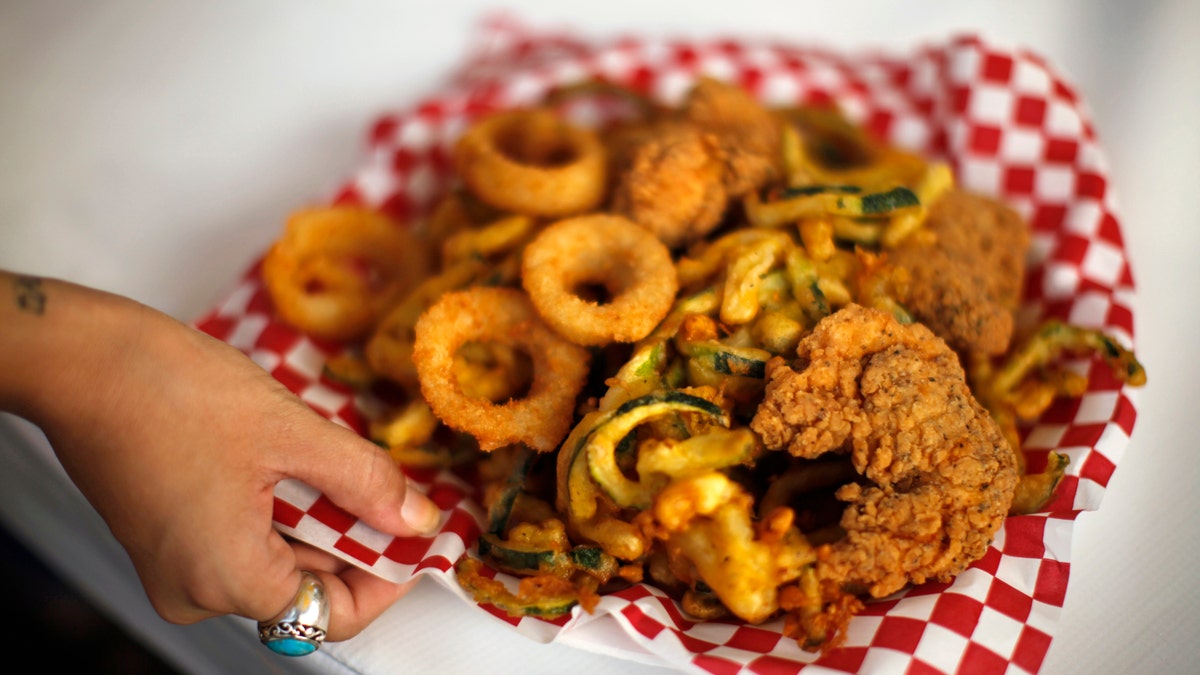
A woman holds a plate of fried food at the Los Angeles County Fair in Pomona, California September 5, 2012. The nation's largest county fair, running from August 31 to September 30, is celebrating its 90th anniversary. REUTERS/Lucy Nicholson (UNITED STATES - Tags: FOOD SOCIETY ANNIVERSARY) - RTR37K1S (REUTERS/Lucy Nicholson)
Attention, French fry addicts: Your favorite food may not be so terrible for you after all.
At least, that's the conclusion made by a recent study published in Food Chemistry that found that the antioxidant content of deep-fried potatoes, pumpkin, tomatoes, and eggplant was significantly higher than sautéed or boiled veggies.
It's no secret among nutritionists that adding a fat source to vegetables—e.g., roasting them with olive oil or using full-fat salad dressing over the fat-free stuff—boosts absorption of fat-soluble vitamins like A, D, E, and K. So it's not totally illogical that deep-frying could take things a step further: When vegetables are fried in a healthy oil (think extra virgin olive oil), antioxidant compounds called phenols in the oil are transferred to veggies, said Frances Largeman-Roth, RD, author of “Eating in Color,” who was not involved in the study. In other words, a hot oil bath doesn't just unlock nutrients already inside vegetables—it actually helps infuse them with more nutrients than they started with.
MORE: The Super Common Oil That Science Now Shows Is Worse Than Sugar
As for other greasy goodies like fried chicken, popcorn shrimp, and cheese curds, researchers don't know whether these foods soak up any phenols at all when fried. Largeman-Roth speculates that these foods have lower water content than vegetables, which doesn't allow them to soak up as much oil (and, consequently, phenols), if any at all.
These findings, while exciting, don't give you a carte blanche to go crazy on those fried zucchini chips whenever you feel like it, though. All that oil—and batter if veggies are coated before fried, which most are—means major calories, which could spell a fast-track to weight gain, overconsumption, and other health problems.
Also, researchers fried veggies in extra virgin olive oil, which is known for its sky-high levels of phenols. Frying in regular olive oil or refined vegetable oils prolific used by most restaurants might not have had the same effect, Largeman-Roth said. Even worse, some restaurant frying oils contain trans fat. (Here are 14 cooking oils and which is the healthiest for you.)
Oil temperature is also an issue. While frying in EVOO can imbue your veggies with more antioxidants, those benefits backfire if the oil gets too hot.
"If you heat any oil past its smoke point, it starts to break down and release free radicals," Largman-Roth said.
The study used a fry temperature of around 350 degrees, which is safely below extra virgin olive oil's 400 degree smoke point. (Try this healthy gluten-free 'fried' chicken.)
Of course, you can't control the type of oil or temperature used in a restaurant fryer, but you can at home. What to do? If you want to eat fried food as an occasional indulgence, stick to vegetables that you fry at home in high-quality oil, using a fry thermometer to make sure the oil doesn't go above its smoke point. Eggplant parm, here we come.
